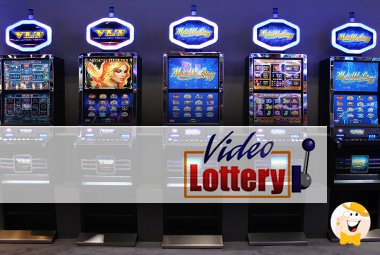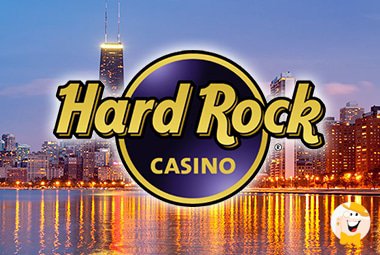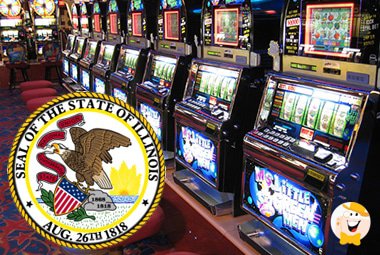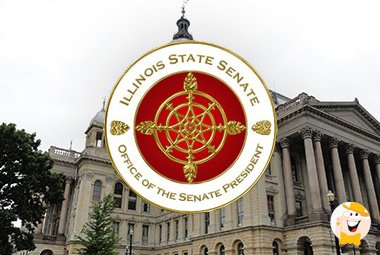
They say that necessity is the mother of invention, and budget necessities in the State of Illinois have resulted in the drafting and passage of Senate Bill 7, which will significantly increase gambling operations in the State of Illinois. While the bill got through the Senate by the wide margin of 33-24, it remains to be seen whether or not it will pass the House, or even the committee currently tasked with considering it, for that matter.
The one thing that is ironic is the fact that casino-related Legislation often only seems to come about when states are facing an otherwise insurmountable budget deficit and the shortfall of revenues. Arguably, such shortfalls might not otherwise be the case if the state was garnering the tax revenues that would have come as a result of increasing gambling operations prior to staring right down the proverbial barrel of an existing deficit. Of course, bureaucracies being what they are, the passage of laws, in general, is largely reactive rather than proactive.
Better late than never, says the Illinois Senate, who have come up with a bill that will expand gambling operations in virtually all segments.
While, as with states such as Montana and West Virginia, Illinois has had limited video lottery retailers (i.e. slot parlors) for quite some time, one significant lack has been in more traditional forms of commercial gambling. That’s not to say that Illinois doesn’t have any casinos at all, but pursuant to current laws, that those casinos are limited to riverboats. While the riverboat casinos produce a steady stream of revenue for the state and are certainly better than nothing, there are a number of markets that are essentially missed by them.

Depending on where you are in the state, when you want to visit a casino, you might be more likely to look to neighboring states such as Indiana, Wisconsin or Missouri. Any potential gaming revenues from residents of Illinois taking their gaming craving to those states represent a direct loss in potential tax revenues. It is in the best interest of Illinois to plug this hole.
Casino Expansion:
In order to give more residents of the state access to major commercial casinos, the first aspect of the bill is such that as many as six additional casinos will be licensed across the state and will not be limited to riverboats. The obvious result, of course, is that an increased number of residents of the state will have access to casinos within the state.
In the meantime, these new casinos will be likely to compete for patrons who may be residents of neighboring states. Certainly, a new casino coming to Western Illinois would lead to individuals from eastern Missouri coming over to take a look at the new property, and the effect will likely be the same for other states near the border. Perhaps even more importantly than geographical proximity is the fact that these casinos will be new, and therefore, exciting.
Increased competition in that general area of the Midwest should also be a positive for players as any increased competition among commercial casinos should lead to both better games and marketing enticements to visit. Furthermore, Illinois may be able to bring in individuals from even further away depending on who the new players in the casino market end up being. For instance, Hard Rock and CET are two companies with a long marketing reach, among others.

In the meantime, one of these new casinos is expected to be in Chicago, a jurisdiction that will be issued a casino license unto itself to do with as they like. The Chicago Casino Development Authority will be created and any property owned or leased by that Authority will be tax exempt, which will lead to a significant ability to reduce costs for a potential casino. Additionally, the license granted to the Authority will be irrevocable and perpetual. That means that it cannot be taken away and there will be no need to ever renew it.
As far as the other five licenses are concerned, who those go to will largely be up to the Illinois Lottery Commission. But there will certainly be no shortage of casino companies ready, able and willing to build in the Land of Lincoln. In any case, there is no reason to believe that these casinos will not do as well as any others.
Some might wonder whether the gambling expansion will cause irreparable financial harm to existing operators, as these new properties will almost assure additional competition even for them. The Illinois Senate has apparently even addressed this issue by reducing taxes on the revenues of the currently operating locations, be they riverboats or slot parlors, assuming the bill passes as molded.
The Tax Implications:
The Illinois Senate has apparently crunched the numbers and believes that the revenues that will be derived from the six new major casinos will be more than sufficient to enable them to offer existing operators a tax break. The way that Illinois currently taxes gaming revenues is on a sliding scale with certain minimums and maximums depending on the amount in gaming win garnered by a particular location within a calendar year.
The current range of taxes paid on revenues for both riverboats and Limited Video Lottery locations ranges from 15%-50%, depending on the amount of revenue garnered. This tax rate applies to both table games as well as electronic gaming devices, but are accounted for separately. The first thing that the bill will do is reduce the maximum tax on table games from that 50% number down to 16% on anything over $70,000,000 with a base tax rate of 10% on the first dollar.

The base tax rate on the machines will also be reduced to 10% initially, and still going up as the revenue goes up for a year. Regarding the maximum rate, it will remain at 50%, but it will not kick in until a location has garnered 800 million dollars in total machine win.
Whether or not those maximum thresholds will even be seen is in doubt, particularly on machines, as no casino currently meets that threshold on electronic devices among the existing operators. When it comes to the riverboat casino operators, in fact, only Rivers Casino exceeds the maximum threshold that would be in place when it comes to table games. In any event, the casinos currently operating will effectively pay a lower percentage of their overall revenues in taxes to the state.
It is also important to keep in mind the distinction between a tax on revenues and an income tax. A tax on revenues is a tax on any money won by the casino, which means that a casino could theoretically take a loss after expenses (employees, utilities, etc.) but still end up paying a significant amount in taxes. What that means is that, while the values would differ from property to property, a decrease in revenue-based taxes could result in a property actually making more in profits even if they are achieving less in gambling win. While the increased competition will certainly not be helpful given the sheer amount of win that some locations will lose to the new casinos, it will definitely help those businesses that still find themselves in places that are otherwise out of the way. Not to put too fine a point on it, but owners of the parlor-type locations should be positively thrilled if the bill passes.
That’s especially true since we see that the parlor market is truly different than the commercial casino market, as is evidenced by the success of the Dotty’s chain (as well as other slot bars) in Las Vegas, Nevada.
It’s difficult not to be in favor of that measure overall as it will be beneficial for the parlors, many of whom are essentially small business owners, some of which are entirely independent as they only own one location. In the meantime, if the existing riverboat properties manage to save some money overall, then they will be able to (hopefully) put some of that money back into their properties to compete more meaningfully with the new six casinos as well as those in other states. Furthermore, the reduced tax rates would take effect prior to all six of the would-be new casinos opening.
More Parlor Benefits
The benefits to the parlor-type locations do not end with reduced taxes on their revenues, there is even more to it than that. As a jurisdiction with similar Limited Video Lottery, West Virginia, is considering, there will be a number of changes made to regulations for those businesses.

The first major change is that Illinois would double the maximum permissible bet that can be made on the machines as well as doubling the maximum possible jackpot. In that sense, the parlors should theoretically appeal to more people who may be looking for more action on a slot machine spin or video keno bet than they may be getting now. Not to put too fine a point on it, but the current maximum bet amounts and maximum jackpot availability is boring for some people.
In addition to that, the parlor-type locations will be able to expand the platform of the machines that they offer. Much like in West Virginia, progressive-based jackpots cannot technically be offered in the State of Illinois at the parlors, and as a result, a number of slot machine titles are unavailable for play. Furthermore, such limitations also make video poker progressives impossible, despite the fact that those types of games are especially popular in commercial casinos.
These two developments will be nearly essential for parlors located in close proximity to any of the six new casinos that might open because, while they do have their own market of gamblers to a certain extent, some of their regulars will favor the casinos instead. However, if your favorite game is also available in a parlor, and you prefer the parlor atmosphere, then one would think that you would continue to visit the parlor.
The overall effect of these changes is such that these Limited Video Lottery locations will be given the opportunity to compete with the casinos on an almost equal footing for machine players.
Will It Be Signed if the House Passes It?
Getting through the House and then the Senate (or the other way around) only constitutes two of the first three steps for a bill. The final step is it getting approved by the Executive Branch, which in this case means being signed by Governor Bruce Rauner.
The Governor has not spoken to this specific bill, but he has said that he would approve a casino expansion bill if it served to shore up the budget and put the budget standstill in the Legislature to an end. Again, the Governor has not spoken specifically to individual provisions in the bill, but it seems that he favors anything that will right the budget in general terms.
Will It Work?
Here’s the thing: It is tough to say whether or not it will work as well as the Illinois Senate believes that it should. The first major consideration is the fact that commercial casinos very rarely live up to the revenues that are anticipated by analysts. One significant reason for this is because those analyzations often take place based on whatever the ‘Current,” gaming market is at the time that the analysis takes place. While that seems reasonable enough, it also results in the possibility of unintentionally ignoring other developments in nearby locales that, at the time, may or may not happen.
For example, in looking at long-term projections, the two Connecticut casinos probably did not look at the surrounding states (with exception to New Jersey and West Virginia---which isn’t all that close) back in 2000. In the meantime, though, projections were almost certainly made and would have fallen way short as the majority of surrounding states whose denizens would have otherwise gone to Mohegan Sun or Foxwoods now have casinos even closer to home.

Furthermore, and perhaps most importantly, the reduction of the tax rates across-the-board is a very serious gamble by the Senate. The decreases, which mostly affect casinos on the low end of the revenue scale, will be nothing short of substantial when taken as a whole. The ultimate result is that the State of Illinois will have to hope that there is enough of a new casino market coming from Illinois residents as well as those of other states to make up for the revenue loss that they are essentially deliberately taking.
To give a simple example, let’s say that I taxed revenue from 100 different companies at a rate of 15%, and the average company had revenues of $120,000 on an annualized basis. That would mean that I garner $1,800,000 in taxes on the revenues of those businesses. If I reduce the overall tax rate to 10%, though, now I am garnering $1,200,000 from those already existing businesses. If I reduce this in conjunction with licensing two new businesses, though, I would need those businesses to combine for $18,000,000 in total revenues compared to the $12,000,000 I previously needed, just to break even.
While my example does not represent the reality of the situation dollar-for-dollar, because my example is meant to be simple, it does convey the general concept of what is going on. In my example, the current businesses, as well as the new ones, would have to come up with another $6,000,000 in taxable revenues in order for me (as the state) to break even on tax intake as compared to what I was already doing.
The goal of the Illinois Senate, of course, is most certainly not to break even as they seek to improve their budgetary position. They need overall revenues to increase, pretty substantially at that, and they seem to believe that the six new commercial casinos will combine to pull that off.
Conclusion:
Given the unknown potential effects on Illinois tax revenues considering the fact that current operators will pay a lower effective tax rate, it is difficult to say whether or not this bill will accomplish its intended purpose if passed by the House and signed by the Governor. In the meantime, while this may be a negative for the riverboats, (who essentially have a commercial casino product that will need to compete with other commercial casino products) it should be terrific for the slot parlors.
Overall, I have to say that I am in favor of this bill because I support the expansion of gambling, in general, provided it is regulated to be as safe as possible for individual gamblers. The competition also results in the financial necessity which also tends to present itself to players by way of marketing offers and increased comps. In short, more casinos should be seen as a positive for the players.
Finally, anything to reduce the tax liabilities on the parlors and help some of those out (many of whom are small businesses) I also see as a positive. Even with the reduced tax rates, I still find the tax obligations on revenues (rather than realized profits) somewhat onerous, but Illinois is certainly better in that regard than most states.





